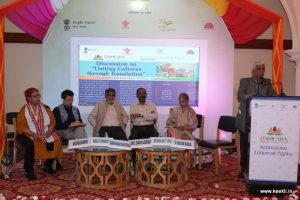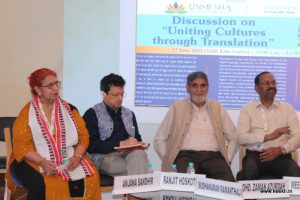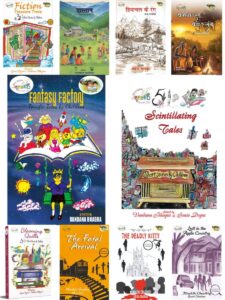
 A discussion on Uniting Cultures through Translation was chaired by Ranjit Hoskote and the discussants were Anjana Sandhir, Meenakshi F Paul, Mohd. Zaman Azurdah, N. Kalyan and Raman Sudhakaran Ramanthali. The discussion revolved around the themes of yesterday’s event which also covered the impact of translation, though it spoke how critical it is to word translation, at the same time the important role transition plays in our society. Without the existence of translation, it was not able to connect to the diverse literature of the subcontinent. Translation is an art that completely changes one’s way of thinking as suggested earlier language as a medium of thinking, it channels the way you look at the world and when you learn a new language you look at the world from the perspective of the foreign languages.
A discussion on Uniting Cultures through Translation was chaired by Ranjit Hoskote and the discussants were Anjana Sandhir, Meenakshi F Paul, Mohd. Zaman Azurdah, N. Kalyan and Raman Sudhakaran Ramanthali. The discussion revolved around the themes of yesterday’s event which also covered the impact of translation, though it spoke how critical it is to word translation, at the same time the important role transition plays in our society. Without the existence of translation, it was not able to connect to the diverse literature of the subcontinent. Translation is an art that completely changes one’s way of thinking as suggested earlier language as a medium of thinking, it channels the way you look at the world and when you learn a new language you look at the world from the perspective of the foreign languages.

 The experience is so colourful and new. This is a very interesting fact that every individual is a translator ought to be precise as every individual who speaks two languages is a translator. The individuals whose mother tongue is Hindi, when discussing with an individual who hails from a different state and has a different mother tongue that tends to use English as the language of conversation, automatically become translators. The very idea of ‘India’ would be non-existent if not for translation. If you think about it carefully the statement seems very simple but its understanding is full of complex systems of cultural exchange between diverse communities in the country. Translation has taken a modern twist.
The experience is so colourful and new. This is a very interesting fact that every individual is a translator ought to be precise as every individual who speaks two languages is a translator. The individuals whose mother tongue is Hindi, when discussing with an individual who hails from a different state and has a different mother tongue that tends to use English as the language of conversation, automatically become translators. The very idea of ‘India’ would be non-existent if not for translation. If you think about it carefully the statement seems very simple but its understanding is full of complex systems of cultural exchange between diverse communities in the country. Translation has taken a modern twist.
 If you look at Netflix shows, they have an option of subbed and dubbed work, these two options are also another form of translation. The translation enables us to interact with societies all across the globe and as soft power is the primary tool for influencing individuals, the importance of translation and its scope is always increasing. The panellists explained that translation is not a thing of the past but it is a system that will be more in demand as the society progresses, in the future, it might be in the form of translating a Python program to English, the only change that will be in the genre of translators.
If you look at Netflix shows, they have an option of subbed and dubbed work, these two options are also another form of translation. The translation enables us to interact with societies all across the globe and as soft power is the primary tool for influencing individuals, the importance of translation and its scope is always increasing. The panellists explained that translation is not a thing of the past but it is a system that will be more in demand as the society progresses, in the future, it might be in the form of translating a Python program to English, the only change that will be in the genre of translators.
 An important highlight of the discussion was that as a reader should read only the translation, as comparisons with the original will be disheartening. The essence or the soul of the original work is always somehow missed and leaves the reader wanting for more.
An important highlight of the discussion was that as a reader should read only the translation, as comparisons with the original will be disheartening. The essence or the soul of the original work is always somehow missed and leaves the reader wanting for more.



